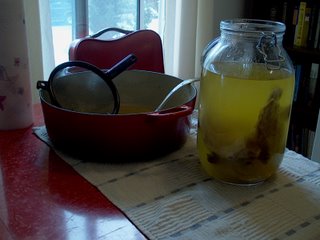Last night Hockeyman and I took visiting relatives to Oliveto, Paul Bertolli's Oakland restaurant. After the salumi starter, Hockeyman and Rose shared a steak with potatoes and olive butter. Stan ordered the lamb chops. BK ate saddle of rabbit stuffed with sausage, pine nuts, and artichokes. As Hockeyman was driving, he stuck to one whiskey sour. Rose, Stan, and BK all ordered second drinks, but lacking the constitution of Anthony Bourdain, were unable to finish them. Instead we ordered dessert--bittersweet chocolate cake, summer berry pudding, zabaglione with fruit--and attempting to regain our faculties with strong coffee.
A magnificent meal. But I can't imagine eating like that all the time....how does Frank Bruni do it? Or the famously slender Amanda Hesser?
Anyway, in honor of Oliveto and their handmade salumi, I offer my paean to pork.....
My porcine dalliances
Last Saturday I prepared pork roast with tomatillos. The recipe comes from Rick Bayless, and can be found in Corby Kummer's wonderful The Pleasures of Slow Food.
While I am an experienced and enthusiastic cook, I had never made pork roast. Prior to last week I'd never bought one, either. I made my way to Berkeley Bowl and conferred with the butcher. I allowed that my Jewish background led to confusion in matters porcine. Loin? Chops? Bone in? Boneless?
She suggested a bone in roast and hailed one of the senior butchers. He vanished into the back, returning with what looked to me like four pork chops stuck together.
"This good?" He barked.
I nodded. I thanked him. The woman suggested olive oil, lemon, and garlic. She wrapped the meat in butcher paper and handed it over. I thanked her, too.
Once upon a time, in the last century, I was a nice Jewish girl from Detroit. Every week I accompanied my mother to Shopping Center Supermarket, a store catering to the city's Jewish community. Though the market wasn't kosher, I have no recollection of ever seeing pork for sale. It must have been someplace, stored in a dark corner where it wouldn't offend.
My family was not religious. We did not keep kosher. But pork had little role in our lives. Once in a great while my mother purchased bacon, which was considered a rare treat. The occasional package of Oscar Mayer sliced ham passed through. My father worked near a German bakery that produced seven-inch round chocolate cakes. These neatly frosted moons were immensely appealing until sliced, allowing the smell of lard to permeate everything. The cakes gave everyone in the family digestive troubles save my father, who ate them alone, doggedly, until they were chalky dry.
If we were not religious, my family was certainly culturally Jewish. We lived amidst other Jews, many of them Orthodox. Every Wednesday, for years, we ate dinner at the Stage Delicatessen: pastrami on rye with mustard, chicken liver, towering corned beef sandwiches with sides of potato salad and dill pickles, all washed down with Dr. Brown's Cream Soda. On Fridays we piled into my grandmother's tiny apartment and ate roast chicken with potatoes, matzoh ball soup, kreplach, and noodle kugel. We bought challah, rye bread, seven layer cake, and babkas from Zeman's bakery, where all the ladies behind the counter were Eastern Europeans with blue numbers tattooed on their arms. In these places it was normal to hear Hebrew, Yiddish, Hungarian, Russian. My mother and her parents spoke Yiddish to one another; for years I did not know whether some words--maven, tsouris, takeh, yutz--were English or Yiddish. I did not need to know, for everyone I spoke with understood me.
Pork had no more place in this world than possum or venison or rabbit. Those were foods eaten by the goyim, people who lived in the Upper Peninsula, hunted recreationally, and got around on snowmobiles.
In other words, nobody we knew.
In this milieu, our occasional brushes with bacon and ham notwithstanding, pork was viewed with horrified disgust. It was dirty, unclean. It was the food of lesser peoples.
I am ashamed, writing this now. How xenophobic we were, how narrow. In my case, I was simply ignorant. The minimal interactions I did have with non-Jews were with people who lived in our neighborhood. They were used to us.
When I was sixteen I acquired a Catholic boyfriend whose favorite restaurant was a chain known for sausage-heavy breakfasts. He took me along one morning, where I sampled my first sausage links. They made me ill--literally. Of course the food was neither high-quality nor well-prepared. Twenty-two years later, I distinctly remember the blackened pool of grease the toast, eggs, and links swam in.
At some point it was decided I should meet his parents, who lived some hours north. We drove up in time for lunch and were served sliced ham. I ate it. For dinner his mother produced a pork roast, then watched me carefully. I did not eat it. The message was clear. To this day I marvel at the woman's cruelty--not only to me, but to her youngest child.
The relationship ended soon afterward, and with it, my porcine dalliances.
When I was seventeen, my family moved to Los Angeles. We were completely unprepared for what we encountered.
Apart from the small group of Orthodox Jews living in Los Angeles' Fairfax district, we found California Jews to be entirely different species than our Midwestern brethren. Tall, tanned, their noses bobbed, they enthusiastically consumed Mexican, Chinese, Vietnamese, and Thai food. A college date took me to a Japanese restaurant, where I sampled the unimaginable: raw fish.
But there were no delis, no bakeries, no kosher butchers. What corned beef we did find was a pale imitation of the Stage. "It's the water," A woman advised us. "The meat doesn't cure the same way out here."
Still, my mother endeavored to cook as she had in Detroit. We had brisket with potatoes. Come April, when our local supermarket brought in a tiny supply of Passover foods, we loaded up on stores of macaroons and sugared jelly candies.
Slowly I came to enjoy the cuisines of my new home, tasting and enjoying Mexican and Japanese foods. I stuck to beef, chicken, and the occasional fish. Then I met the man who became my husband. Because he was always hungry, I learned to cook.
My repertoire was limited: boneless chicken breasts, hamburger, chicken livers. Fearing the oven, I tended to coat everything in layers of egg and Progresso breadcrumbs, followed by frying in a bath of olive oil. Still, my dishes were reasonably edible, sometimes even good. My husband, still then my skinny boyfriend, ventured to ask for pork chops. Would I make them?
The request gave me pause. Centuries of racial aversion pressed upon my head. But my husband is not Jewish. My grandmother's milchig and mleischig silverware lay entangled in my kitchen drawer. To refuse him would be plainly hypocritical. On my next trip to Vons I bought some boneless pork chops.
These were my maiden cooking days. I had yet to learn about lemon, garlic, fresh herbs, or stocks. Nobody knew anything about organic. Humanely raised applied only to veal, as in not eating it. So I brought my inhumanely raised, antibiotically stuffed, cruelly slaughtered chops home, where I subjected them to my usual egg/breadcrumb dip, then (likely overly) sauteéd them in olive oil.
I wish I could say I remember the moment I presented them to my husband. I don't. I am almost forty and losing brain cells with every passing second. But the pork chops must have been okay, because they entered my stovetop cooking pantheon.
My mother was appalled. I pointed out my husband’s Catholicism. Pork chops? she said dubiously.
It is a funny but true fact that marrying a non-Jew is considered acceptable by many, but eating pork or shellfish whilst married to said person is still a grave sin. Of the numerous Jews I know with gentile partners, I am the only one who eats pork. When I point out the inherent hypocrisy in this stance, they shrug. Well, pork. You know...
We were friendly with one such couple. One day the wife left town to attend an academic conference. I invited the husband to dinner. What would you like me to cook? I asked.
Pork chops! He cried. His wife wouldn't allow them in the house. He confessed to missing them terribly.
You cannot control who you fall in love with. You can, however, control what you put in your mouth.
My kitchen prowess gradually increased. I became bold enough to use the oven, cooking the chops--still boneless--in white wine and Japanese mirin, which gave them a nice zingy flavor.
In graduate school I befriended a woman who was an extraordinary cook. She used lemons and garlic and fresh rosemary, which she grew in a pot on her porch. I followed suit. My pork chops, indeed all of my cooking, improved dramatically.
At this point--a decade ago--I did not cook with any other pork. I considered bacon the edible equivalent of Pall Mall Reds-delicious, addictive, fatality-inducing. I thought ham was okay, but neither of us were big consumers of cold cuts. Prosciutto, like steak, was too expensive to even contemplate. I still felt uncomfortable with the remainder the of the pig, the hocks and roast and belly. It was treyfe, garbage. It could make a person sick.
It made me sick when I decided to be adventuresome.
I'd found a meatloaf recipe calling for equal portions of ground pork and beef bound with catsup. I have no idea what possessed me to make this, but at the time mushing two kinds of ground meat into a salty tomato base seemed appetizing. I was inexperienced enough to mistake the meatloaf's red hue as the effects of all that tomato product. Woe unto me: I landed in the hospital with a massive dose of food poisoning.
My husband was fine.
Fast forward: graduate degrees in hand, we moved to the San Francisco Bay Area. We weren't foodies yet. But as our income increased, so did my cooking habit. I began buying cookbooks, subscribing to Gourmet, hankering for expensive kitchen equipment. My husband gained forty much-needed pounds.
Our new neighborhood had a large Latino population, meaning the local Safeway carried an excellent selection of pork products. One day I bought a ham hock, thinking it might be nice in lentil soup.
The hock freaked me out. It was ugly--really ugly, a mean reddish pink, tough to the touch, with a nasty band of fat around what looked to me like the drumstick. Warily I dropped it into the soup, a recipe I'd adapted from Laurie Colwin's Home Cooking: lentils, potato, carrot, garlic, canned chicken broth.
Soon the entire apartment filled with a compelling scent. The hock began looking less menacing and more edible. As soon as I could I pulled a shred of meat free and popped it, boiling hot, into my mouth.
Salty, smoky, meaty. All the best attributes of ham without the slimy wetness. And the soup! The hock had taken a pedestrian dish to a new level, albeit a nitrate-laden one. We all know nitrates are awful for us. I haven't found a source of all natural or organically cured ham hock. I have a day job. I cannot spend all my time sourcing pork.
But the soup was wonderful, and I haven't been without a hock in my freezer since. One of these days I'll buy some greens, dump them into water with a hock, and let everything cook down. Writing this now, I wonder why I haven't yet.
By now I've read Elizabeth David, Julia, Alice, Paul Bertolli. I subscribe to Cook's Illustrated. And I cannot help but notice how many savory recipes call for some form of pig: lardons, proscuitto, salt pork, chopped smoked bacon. For these cooks, pork is like the maligned anchovy, a small yet essential component of a dish, adding depth without overwhelming the recipe. There is Paul Bertolli's recipe for brussels sprouts leaves with bacon and mirepoix. Another, for cabbage with Reisling and bacon. There is the Provençal Beef Daube from Cook's Illustrated, calling for a chunk of salt pork, an item that invariably reminds me of the Little House books. Anthony Bourdain's pork chops with shallot mustard sauce. I have made all of these dishes, and all are delicious.
But back to my Pork Roast with Tomatillo Sauce. Borrowing from Judy Rodgers, I defrosted the meat a day ahead and salted it liberally.
I heated olive oil in my Le Creuset dutch oven and browned the roast, enduring spitting oil in the process. Broiled the tomatillos and two jalapeño peppers. Pureéd said tomatillos and peppers in the blender, creating a gorgeously green sauce. Poured this into the pot where the pork had recently browned, stirred in garlic, cilantro, salt. Enticing smells began filling the house.
I tucked the roast in its green bed and slid it into the oven. A half hour later I added parboiled baby potatoes.
Ninety minutes later we were tucking in. The sauce, which called for the entire pepper, was on the razor's edge of too spicy. But it tasted so good we kept right on eating, taking long rests between bites to clear our sinuses.
Later I contemplated this dish and realized neither chicken nor beef would have worked. Chicken's delicate flavor would have smothered beneath the sauce; beef would have clashed with the tomatillo's acidity. Pork, with its firm yet giving texture and mild, amiable flavor, was the perfect foil. We finished the leftovers the next night with beans and rice. A day in the fridge made it even better.
As with most culinary discoveries, it feels a new world has opened. There is chile verde, rillettes, Richard Olney's French country terrine. There is ground pork, which merits revisiting in Tamasin Day-Lewis' meatball and guacamole recipe. There are countless sausages to be cut up and tucked into soups and black beans and stews.
In eating roast pork with tomatillos, I don't dismiss Judaism or leave a culture I never really belonged to. The truth is I dismissed those things long ago. What I leave behind is my family, who find my forays into community supported agriculture, free-range meats, and refusal to shop in box stores annoyingly Berkeleyesque. Cooking with pork is an outgrowth of where I live, who I've become in this peculiar place.
My porcine dalliances, then, are not about realizing I cannot not go home again.
It is realizing I don't want to.
Still, something is lost. I was thirteen when my grandmother died. She left no written recipes. I never learned how to prepare her knishes or kreplach. I have no idea what made her roast potatoes taste so good, or what went into her poppy seed cookies. Nor do I have children to prepare them for.
Instead, I make pork roast, a postmodern Jew, hopelessly polyglot, moving forward even as my past fans out behind me.







